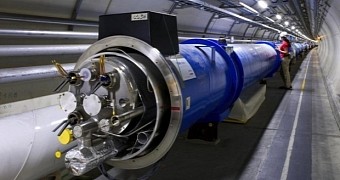Scientists with the European Organization for Nuclear Research (CERN, for short) are happy to announce that, following a 2-year shutdown for upgrades and maintenance, the Large Hadron Collider is at long last ready to restart.
The Large Hadron Collider, often referred to simply as the LHC, sits in the underground just beneath the Franco-Swiss border. It works by accelerating beams of protons to impressive speeds and then coercing them to collide with one another.
The collisions cause the protons to break apart, and the resulting debris eventually clumps together to form new particles, which scientists track down and identify with the help of sophisticated instruments described as hypersensitive microscopes.
CERN researchers explain that the study of these elementary particles birthed by magnet-guided collisions between protons inside the LHC and of the forces holding them together allows them to gain new insights into the makeup of the cosmos.
Back in 2012, the LHC helped discover the Higgs boson, an elementary particle associated with the Higgs field. The Higgs field, whose existence was first theorized in 1964 by physicist Peter Higgs and his colleagues, is said to occupy the entire universe and give subatomic particles mass.
A bumpy restart
Should things go as planned, the LHC will fire up its first proton beams in 2 years sometime this coming weekend, maybe on Monday at the latest. To avoid any mishaps, the beams will be injected into the LHC at an energy of just 450 gigaelectronvolts.
Besides, they will not be made to collide with one another. If these initial experiments prove that the LHC is ready to go and safe to use, the first collisions at energy levels as high as 13 teraelectronvolts will be allowed to happen a few weeks from now, in June.
“We are confident of being able to restart the machine over the weekend, as all of the tests performed so far have been successful,” Frédérick Bordry, the current director for Accelerators and Technology at CERN, explained in an interview.
The LHC was expected to restart by the end of last month. However, on March 21, an intermittent short circuit was documented in one of the magnet circuits that the machine relies on to accelerate proton beams and control their behavior.
Eventually, CERN scientists found that the short circuit was happening because of a small piece of debris that most likely entered the faulty magnet circuit while the LHC was undergoing upgrades and maintenance work. Having figured out what the problem was, it did not take them long to fix things.

 14 DAY TRIAL //
14 DAY TRIAL //